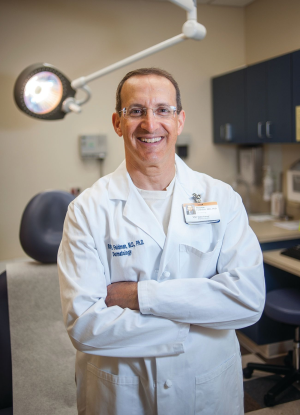
Dr. Steven Feldman, MD
General Dermatology
Provide FeedbackMedical Expertise of Dr. Steven Feldman, MD
Dr. Feldman specializes in medical dermatology, diagnosing and treating a wide range of skin conditions. He has particular expertise in the treatment and management of psoriasis, including the use of biologic medications.
Dr. Feldman has also authored multiple publications regarding patient adherence, patient satisfaction and patient care and is actively involved in medical research.
About Dr. Steven Feldman, MD
Dr. Steve Feldman is Professor of Pathology (Anatomic Pathology) and Dermatology at Wake Forest Univeristy Baptist Medical Center.
Dr. Feldman also serves as Chief Medical Editor of Skin & Aging magazine, a professional publication for dermatologists, and is the founder of DrScore.
He is a member of the Medical Board of the National Psoriasis Foundation (NPF) and chairs that board’s Subcommittee on Education. He also serves as the Director of the Foundation’s Chief Resident’s Meeting on psoriasis treatment.
- Teaching: General Dermatology; Dermatopathology; Biochemistry of Skin
- Research: Photoaging; Psoriasis; Health Services Research
Tips & Wisdom
Over-the-counter benzoyl peroxide is a reasonably potent first line acne treatment and is available inexpensively in OTC preparations. It's a very reasonable first start for treatment.Prescription medications include:A. Topical vitamin A related medications (tretinoin [available generic and in several brand name formulations], adapalene [Differin®], tazarotene [Tazorac®])B. Topical antibiotics (erythromycin and clindamycin)C. Various oral antibiotics,D. Hormonal treatment (birth control pills, f...
Biologics are fabulously effective at treating psoriasis. They are very safe too. Biologics may be a very good choice for people who have extensive psoriasis. Patients may be candidates for biologic treatment when the psoriasis is too extensive to treat with topicals or when there is a debilitating disease that is resistant to other treatments (like palm and sole psoriasis). Biologics are costly. Insurers may have specific policies regarding when they will pay for particular biologi...
Phototherapy has been used to treat psoriasis for centuries. Phototherapy generally involves exposing the skin to ultraviolet light. The ultraviolet light exposure reduces inflammation in the skin. For patients with limited disease, localized phototherapy can be done to individual spots of psoriasis. For patients with extensive psoriasis, whole body phototherapy can be done. There are many ways to get ultraviolet light on the skin to treat psoriasis. Some dermatologists offer in-office tre...
Step 1 to treating psoriasis is to educate patients about the condition and the available treatments. A great way to do that is to encourage them to join that National Psoriasis Foundation and to use the Foundation’s resources that are available at www.psoriasis.org. Step 2 is to screen for psoriatic arthritis. If there are signs of arthritis, I want the patient to have a thorough evaluation from a rheumatologist. Step 3 is to determine if the patient has limited (mild-to-moderate) p...
Topical corticosteroids are very effective psoriasis treatments, especially if used well. They are available in a variety of vehicles—ointment, cream, gel, solution, foam, shampoo, etc—giving patients the flexibility to use a formulation that appeals to them. It may help to keep the treatment regimen as simple as possible, just one or two medications, as otherwise the complexity of treatment may make it hard for patients to use the treatment regularly.
Topical vitamin D is a moderately effective treatment for psoriasis. It can be used separately from topical corticosteroids or in combination products. They tend to be more costly than topical corticosteroids, but vitamin D analogs don’t have topical corticosteroid side effects. Prescribing separate steroid and vitamin D products complicates treatment and could make it harder to adhere to the treatment regimen.
Patient Education Resources
Truncal acne, which refers to acne that occurs on the trunk of the body (such as the chest and back), may require a slightly different treatment approach than facial acne. This is because the skin on ...
Botox® (botulinum toxin type A) is a medication that is primarily used to temporarily paralyze specific muscles in the face and body.It is most often used to improve the appearance of wrinkles and...
Atopic dermatitis, also known as eczema, is a chronic, inflammatory skin condition that causes dry, itchy, and scaly skin. The condition is characterized by symptoms such as:Dry, itchy skin: The skin ...
Microneedling is a cosmetic procedure that involves using a device with fine needles to create tiny punctures in the skin. The needles are typically between 0.5mm and 2.5mm in length, and are used to ...
The treatment for severe atopic dermatitis will depend on the individual case, but it may include a combination of the following:Topical corticosteroids: Topical corticosteroids can be used to reduce ...
Education & Training
- Undergraduate Degree: University of Chicago, BA 1980
- Postgraduate Degree: Duke University School of Medicine, PhD 1985; Duke University School of Medicine, MD 1985
- Medical Internship: Duke University Hospital 1986-1987
- Residencies: Medical University of South Carolina 1990-1991; North Carolina Memorial Hospital 1987-1990
- Fellowship: Dermatopathology
Professional Affiliations
Steven R. Feldman, M.D., PhD - Dermatologist
The Department of Dermatology at Wake Forest School of Medicine strives to improve skin health in all patients; educate patients, students and residents about skin disease; and to improve skin health through research. As the region's leading dermatology department, we provide top-notch training for future practitioners of dermatology and a productive setting for basic and applied research on diseases of the skin.
